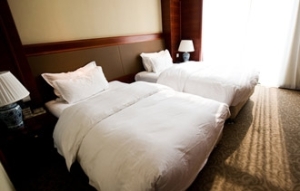As big a fan as I am of today’s business hotels–and I’ve said repeatedly in this space that they’re the best part of traveling for work–I’m reminded almost every week that there is room for improvement.
Drawing on conversations with other road regulars and on my own experience, I’ve compiled a list of hotel gripes. All are easy enough to fix with minimal investment, training or policy changes. And unlike airlines, which are stuck in a financial box with a product that has become a commodity, most hotels seem to truly care what their customers want. Nevertheless, these same issues keep showing up at hotels across the country, from bargain brands to four- and five-star chains.
No bathtub.
Who are these focus-group participants telling hotel executives that business travelers don’t take baths? Air travel is more physically taxing than ever, and after pulling a Rollaboard through an airport, packing and unpacking my computer bag at security, lifting my suitcase (stuffed to the limit so I don’t need to check anything) to the baggage compartment and then on and off the rental car shuttle, I relish a hot soak. But walk-in showers, once found only in wheelchair-accessible rooms, are replacing bathtubs with each new round of renovations.
And while we’re on the topic of baths, could housekeeping please leave the shampoo in the shower or tub where I left it last night? Especially at service-obsessed high-end chains such as Ritz-Carlton, the protocol is to move amenities back to the sink so they look nice. And they do. But that’s small consolation to me once I’m wet.
The demise of the clock radio.
Some hotels have a new generation of clocks that have done away with radio altogether. Sure, you can dock your iPod and listen to your tunes, but that won’t give you the local news, a ballgame or the late-night drone of a call-in show (the best soporific I know).
And another thing: If housekeepers would check to make sure the alarm isn’t set before proclaiming the room ready for occupancy, I’d have far fewer unwanted 5 a.m. wake-ups. I know I can check for myself before turning off the lights. But I shouldn’t have to.
Not enough outlets.
Business travelers use outlets by the desk for charging a laptop, phone, iPad, iTouch–sometimes simultaneously. But at more than half the properties I visit, I find myself on my hands and knees hunting for places to plug in, or relegating my phone to the bathroom overnight.
No local papers.
USA Today and The Wall Street Journal don’t tell me the weather, sports events, TV channels and political gossip applicable to where I happen to be. Business hotels look alike, as do the office parks and malls that surround them. Give me a fighting chance to feel like I’m in an actual place with a local paper outside my door.
The high price of breakfast.
I don’t care how much it costs a hotel to make an omelet. When you’re charging $14, and the place across the street is making one just as good for $5, it can’t help but make me feel I’m being ripped off.
There’s more–internet for a price, dysfunctional parking-lot attendants, concierges who know less than I do and front-desk phones that ring and ring–but I’ll stop here. And I’ll gladly suffer through all these pet peeves rather than return to the days when workout rooms were the size of walk-in closets, HBO cost extra, Wi-Fi was a novelty and the average hotel bed had the topography of a mountain range. The business-hotel experience is, in general, terrific. But paying attention to details like these would make it even better.
If you got a problem, yo, I’ll solve it
Whatever your hotel pet peeves, general managers are there to address the issues. Here’s how to help them help you.
Be friendly
Brian Moloney of the Wyndham Cleveland advises guests to be cordial to a front-desk employee–or, even better, a manager–when they check in. “Make eye contact, just like we would do with a guest,” Moloney says. That way, if you have a problem and call downstairs to rectify it, you’re more than a room number.
Go straight to the top
The chain of command is supposed to work, but issues often get lost in bureaucracy. “Go directly to the general manager,” says James Horsman of The Madison, a 356-room independent property in Washington, D.C. “Ninety-nine percent of the time that something hits the general manager’s desk, it will be expedited immediately.” He suggests getting the GM’s e-mail address. “I carry a BlackBerry that’s on 24/7,” he says.
Don’t embellish
When stating your gripe, honesty is the best policy. “I can tell what time you got in, who you dealt with at the front desk, all of that, because I have video cameras everywhere,” says Mark Sanders of the Sheraton New York Hotel. “So overstating what actually happened won’t serve you well.”
Make your feelings known
“So many guests leave and never tell us what went wrong, and we don’t hear about it until we read the surveys,” says Ulrich Samietz of the Hyatt Regency Vancouver. By stating your case face to face, you’ll give the staff a chance to address the issue and, perhaps, compensate you for your troubles. A TripAdvisor post or survey response will get you neither. –B.S.
Read more stories about: Hotel Staffing Solution, Customer service, Hotels, Business travel, Customer feedback
This article was originally published in the January 2013 print edition of Entrepreneur with the headline: I’d Like to Lodge a Complaint.



